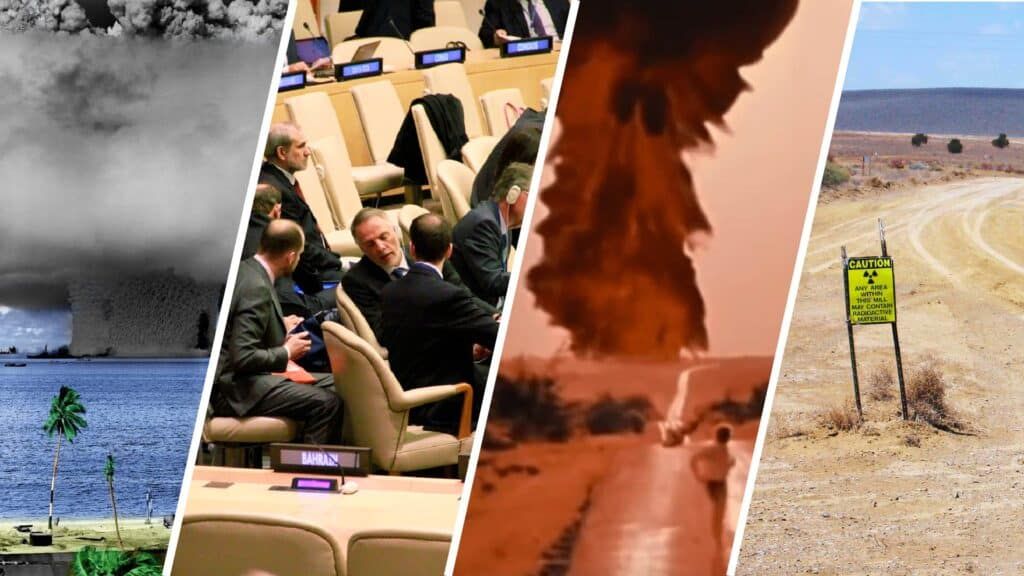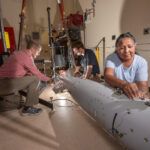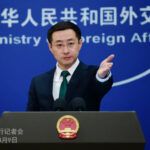Roundtable: Making nuclear injustice an agenda for change
By Franziska Stärk, Ulrich Kühn | February 2, 2023

In a recent essay for the Bulletin, we argued that the global nuclear order is fundamentally unjust. We called for critical reflection on past, ongoing, and future nuclear injustices to better connect the dots between scholarly fields and social movements. For this roundtable, we invited four scholars, practitioners, and abolition advocates to further articulate what a research agenda on nuclear injustice should look like.
Rebecca Gibbons stresses the importance of including those most burdened by past nuclear injustices in the discussion. Setting forth the impact of nuclear testing on the Marshallese people, Gibbons highlights their calls for an apology by the US government, sufficient medical care, and the right to return to a safe and remediated environment.
Alexander Kmentt highlights the Treaty on the Prohibition of Nuclear Weapons as a useful prism to examine current efforts—both substantive and procedural—to address nuclear injustice. Kmentt emphasizes the treaty’s contribution to the democratization and reframing of nuclear debates.
Benoît Pelopidas warns of the pitfalls of a nuclear injustice lens, which could ultimately strengthen arguments in favor of nuclear weapons if based on a conservative reading of nuclear deterrence. Instead, Pelopidas outlines several avenues for a productive research agenda, including a critical reflection on the consequences of nuclear injustice.
Mari Faines considers the effects of colonialism, White supremacy, and racial injustice on nuclear weapons policy. She concludes that efforts to address nuclear injustice must include marginalized voices, build on today’s young people, and be sensitive to intersectionality.
We welcome these valid arguments in favor of broadening the debate about nuclear injustice as they point to the necessity of an inclusive agenda, reaching beyond the usual boundaries of the nuclear policy field and community. One such boundary which deserves more emphasis pertains to the well-being of future generations. Under current policies and conditions, the acute risk of living through a climate collapse grows exponentially for each successive generation, whereas the risk of nuclear war does not necessarily grow further. But a large-scale nuclear war, should it ever occur, would basically end civilization as we know it. While world leaders—as recently as in the communiqué of the last G20 summit in November 2022—increasingly warn of the renewed threat of nuclear use, this obvious potential for intergenerational injustice still lacks prevalence in today’s policy discussions. In addition, the political and financial opportunity costs, should countries reengage in the practices of arms racing, must also be factored in when assessing future generations’ chances for organizing global peace and prosperity.
Another boundary relates to conventional wisdom about the alleged benefits of nuclear deterrence. As the war in Ukraine seems to confirm, deterrence practices keep nuclear-armed countries and their allies safe from large-scale aggression. But the war and its consequences also expose the cynicism of those who mistake the absence of large-scale aggression between nuclear powers for a global, sustainable model of peace.
A framework that seeks to rectify nuclear injustice could unintentionally end up replicating Kenneth Waltz’s argument that more nuclear-armed countries make for a safer world. Given the past and possible future injustices that the four contributors to this roundtable spell out, more nuclear-armed countries—and therefore more nuclear weapons—would only aggravate these injustices, not reduce them. At a minimum, such a recipe would trade injustice for injustice. More research on how to prevent new injustices is therefore necessary. More political action is equally needed. If we want to make sure that future generations do not inherit an unsustainable and unjust security architecture, the nuclear injustice framework must become an agenda for change.
Together, we make the world safer.
The Bulletin elevates expert voices above the noise. But as an independent nonprofit organization, our operations depend on the support of readers like you. Help us continue to deliver quality journalism that holds leaders accountable. Your support of our work at any level is important. In return, we promise our coverage will be understandable, influential, vigilant, solution-oriented, and fair-minded. Together we can make a difference.

















By Rebecca Davis Gibbons
What justice means to communities affected by nuclear testing
By Alexander Kmentt
How the ban treaty addresses the inherent injustices of nuclear weapons
By Benoît Pelopidas
Nuclear injustice: Suggestions in support of a research agenda
By Mari Faines
No justice is possible without studying the injustices of nuclear weapons